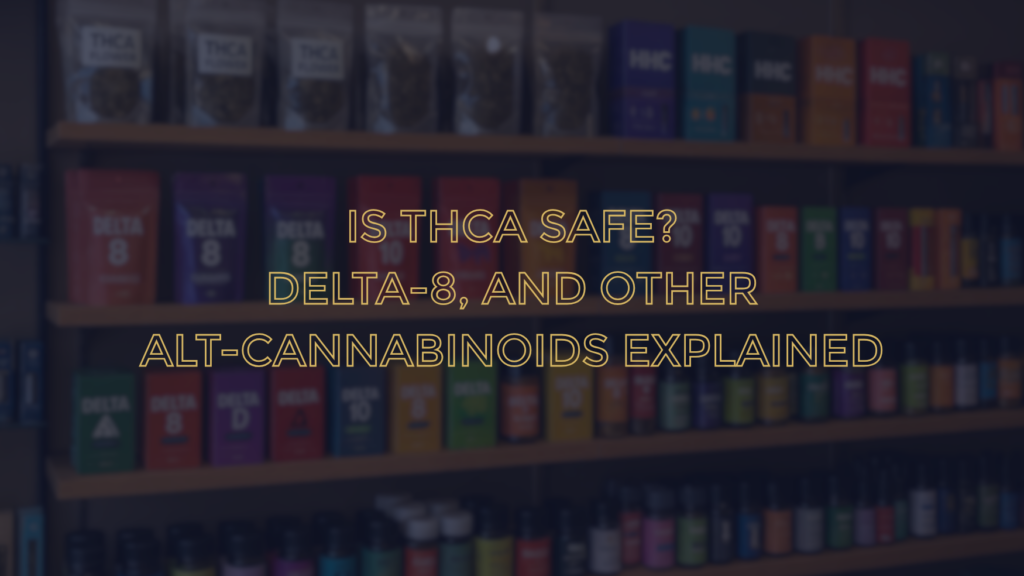
Over the past few years, shelves at gas stations, smoke shops, and online stores have quietly filled up with products labeled as Delta-8, HHC, THCA flower, and other “legal” cannabis alternatives. They’re marketed as hemp-derived, compliant with federal law, and available to anyone over 21, even in states where recreational cannabis is still illegal.
At first glance, it looks like a dream come true for people who can’t access legal weed. But once you dig a little deeper, the picture gets a lot murkier. While these products might seem like a safe, legal alternative to cannabis, the truth is they exist in a legal gray area, made possible by a loophole in the 2018 Farm Bill. And because they’re completely unregulated, they raise some serious safety concerns.
The 2018 Farm Bill and the Rise of “Legal Highs”
So how did we get to intoxicating hemp for sale across the country, banned in over a dozen states and completely unregulated in most?
In 2018, Congress passed the Farm Bill, a piece of legislation that federally legalized industrial hemp. Hemp is defined as cannabis that contains less than 0.3 percent Delta-9 THC by dry weight. That’s the main psychoactive compound in cannabis, and the one that gets you high.
What lawmakers didn’t anticipate was how this small legal distinction would lead to the explosion of hemp-derived cannabinoids that do get you high, but aren’t technically Delta-9 THC.
Chemists realized they could take CBD extracted from hemp, put it through a chemical conversion process, and create compounds like Delta-8 THC, Delta-10, HHC, and others. These cannabinoids produce intoxicating effects similar to traditional cannabis but fall outside the language of the law.
Because they’re “derived from hemp,” these products are often sold as legal under federal law. And since many states haven’t updated their policies to ban or regulate them, they’re widely available, even where cannabis is still illegal.
THCA Flower and the Illusion of Legality
Among these products, THCA flower has become one of the most talked-about and misunderstood. THCA is the acidic, non-psychoactive form of THC found in raw cannabis. But once it’s heated—by smoking, vaping, or baking—it converts into active THC, which is very much psychoactive.
So how is THCA flower being sold legally? It comes down to a technicality. As long as the Delta-9 THC content stays under the 0.3 percent threshold, the flower can be labeled as hemp. But that same flower can contain 20 percent or more THCA, which turns into THC when you use it. In practice, this is just regular cannabis, rebranded to slip through a loophole.
Another example of this practice is with psychedelic mushrooms and even cannabis seeds. It is perfectly legal to purchase psilocybin mushroom spores online for “research purposes”, or cannabis seeds as “novelty items”. But once you inoculate those spores, or plant those seeds, it becomes illegal again (depending on where you live, of course).
There’s no meaningful difference between high-THCA hemp flower and the cannabis you’d buy at a dispensary, other than the label and the lack of regulation. This allows people in prohibition states to access cannabis-like products, but it also allows producers to sidestep consumer safety rules.
Why Consumers Are Turning to Intoxicating Hemp
It’s not hard to see why these products are popular. In many parts of the country, especially where cannabis remains illegal, people are eager for access to products that can provide a similar experience. Hemp-derived THC products are easy to find, require no medical card, and are often sold at lower prices than regulated cannabis.
These products can also be found in a variety of places, from gas stations and smoke shops to liquor stores and even dedicated “hemp” dispensaries. In other words, these products are very accessible, and often times affordable.
Some consumers are drawn in by the novelty of intoxicating hemp. They’re curious about new cannabinoids (AKA Alt-cannabinoids) or alternative ways to feel the effects of THC. Others see it as a way to access cannabis medicinally in states where it is not legalized. But for many, it’s just a “legal” way to get high.
There is nothing wrong with this inherently. In fact, it could be seen as a way to spread the benefits and recreational enjoyment of cannabis to states where they don’t yet have legal access, and promote the broader legalization of the plant.
Unfortunately, these products often come with none of the protections or transparency consumers should expect from something that affects their health and well-being.
The Risks Behind Intoxicating Hemp and Alt-Cannabinoids
Here’s the part that often gets left out of marketing materials. Many of these hemp-derived cannabinoids don’t occur in high enough quantities naturally to be extracted directly from the plant. Instead, they’re made through a chemical conversion process that takes isolated CBD and alters it using solvents, acids, and catalysts to produce Delta-8, HHC, or similar compounds.
There are no federally accepted standards for how this conversion should be done. No one is required to test the final product for residual solvents, heavy metals, unknown byproducts, or synthetic contaminants. And because in most cases these products aren’t regulated by a state cannabis board, producers can essentially say whatever they want on the label.
Some companies do provide lab reports, but many of these are incomplete or manipulated. In too many cases, testing is performed in-house or by a friendly third party that doesn’t test for impurities or includes only cannabinoid content while ignoring contamination.
In legal cannabis markets, products must pass multiple, strict lab tests before they ever reach shelves. These tests check for everything from mold and pesticides to solvent residue and heavy metals.
In most states, consumers can access these results before buying, and if a product fails, it’s pulled from the market.
The CLEAR operates in multiple states, working with various manufacturing partners. Every partner we work with is required by law to send every single batch of product for testing, every time a new batch is produced. Anybody can see these results by simply asking at the dispensary. But there is a level of trust in legal cannabis markets that consumers are getting safe, regulated products, because they are.
None of that exists in the world of intoxicating hemp. You’re taking the manufacturer’s word for it—and that’s assuming they even provide test results at all.
Shady manufacturers will rely on the consumer’s lack of knowledge about regulation, and lack of experience analyzing certificates of analysis to claim that they provide test results while excluding key data.
Why Legalization Is the Real Solution
If there is a positive to pull from the meteoric rise of the intoxicating hemp industry, it is that these products prove there’s a massive demand for cannabis across the country. People clearly want access to legal cannabis, even in places where lawmakers haven’t caught up.
But these workaround products aren’t a sustainable or safe solution.
Cannabis should be legalized at the federal level. Not just to give consumers legal access, but to ensure they have safe access.
When cannabis is regulated it is tested, labeled accurately, and sold through licensed retailers who are held accountable. When it’s not, consumers are left to navigate a confusing, risky market on their own. In this sense, there is no difference between buying intoxicating hemp online, or shopping the illicit market in your local area.
The Farm Bill loophole was never meant to create a shadow version of the cannabis industry. It was designed to legalize non-intoxicating hemp for agricultural and manufacturing purposes. But now we’re seeing THCA flower that’s indistinguishable from dispensary cannabis and vape carts made with sketchily-made Delta-8 sold in convenience stores with no oversight. That’s not a win for cannabis. It’s a warning sign that we need real reform.
Be a Cautious Consumer
At the end of the day, if an intoxicating hemp product gets you high, it’s cannabis in all but name. And cannabis should be regulated accordingly.
Hemp-derived THC products may be legal in the eyes of the law, but that doesn’t mean they’re safe or trustworthy.
Consumers deserve better. They deserve to know what they’re putting into their bodies, how it was made, and whether it passed the same safety standards as safe, regulated cannabis. That level of trust and transparency won’t come from loopholes or chemical conversions—it’ll come from smart, inclusive legalization.
Until then, be cautious. Ask questions. Demand test results. And most of all, support efforts to bring safe, legal cannabis to everyone!

